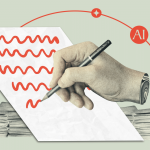Image by Author
If you are a machine learning student, researcher, or practitioner, it is crucial for your career growth to have a deep understanding of how each algorithm works and the various techniques to enhance model performance. Nowadays, many individuals tend to focus solely on the code, data, and pre-trained models, often without fully comprehending the machine learning model’s algorithm or architecture. They simply fine-tune the model on a new dataset and adjust hyperparameters to improve performance. However, to truly excel in building your own model and advancing AI technology to the level of systems like ChatGPT, you must start with the basics, delving into linear algebra and mastering the fundamentals using Python libraries.
In this blog, we will explore five free books designed to enhance our understanding of machine learning algorithms. These books come with code examples, detailed diagrams, mathematical explanations, hands-on exercises, and real-world projects, offering a solid foundation in machine learning.
1. An Introduction to Statistical Learning
Authors: Gareth James, Daniela Witten, Trevor Hastie, and Robert Tibshirani
The book An Introduction to Statistical Learning is particularly well-suited for beginners and intermediate learners, offering clear explanations and practical examples of machine learning algorithms. It covers a wide range of topics, including linear regression, classification, resampling methods, unsupervised learning, and deep learning. The authors have done an excellent job of making complex concepts accessible, making this book a valuable resource for anyone looking to get started with machine learning.
The book is currently available in two versions: one that contains R examples and the other that contains Python examples.
2. Approaching (Almost) Any Machine Learning Problem
Author: Abhishek Thakur
The book Approaching (Almost) Any Machine Learning Problem offers a systematic approach to solving a wide range of machine learning challenges. The book covers essential topics such as data preprocessing, feature engineering, model selection, and evaluation metrics. It provides clear explanations and real-world examples, making complex concepts accessible and actionable for readers, whether they are beginners or seasoned professionals in the field.
3. Mathematics for Machine Learning
Authors: Marc Peter Deisenroth, A. Aldo Faisal, and Cheng Soon Ong
The Mathematics for Machine Learning book covers the key mathematical concepts that underpin machine learning, including linear algebra, vector calculus, probability and distributions, and linear regression. By building a strong mathematical foundation, readers will be better equipped to understand and implement complex machine learning algorithms. The book is well-structured and provides numerous examples, mathematical quotations, and diagrams.
4. The Hundred-Page Machine Learning Book
Author: Andriy Burkov
The book The Hundred-Page Machine Learning Book is a short yet complete guide that breaks down the key ideas of machine learning in a simple way. It covers many topics, from basic algorithms to advanced techniques, the book provides clear explanations and practical insights without overwhelming the reader. Specifically, it covers supervised and unsupervised learning, ensemble methods, deep learning, and natural language processing.
This book is great for both beginners and experts who want a quick but thorough look at the field. By being clear and brief, it helps readers understand the basics of machine learning quickly.
5. Hands-On Machine Learning with R
Author: Bradley Boehmke and Brandon Greenwell
news|news|news|news|news|news|news|news|news|news|news|news|news|news|news|news|news|news|news|news|news|news|news|news|news|news|news|news|news|news|news|news|news|news|news|news|news|news|news|news|news|news|news|news|news|news|news|news|news|news|news|news
The book Hands-On Machine Learning with R is a practical guide for learning machine learning using the R programming language. It covers both basic and advanced topics, providing clear explanations and plenty of examples. The book starts with fundamental concepts of machine learning and then covers various algorithms and techniques used in supervised learning. After that, it delves into dimensionality reduction and clustering.
The book emphasizes hands-on practice with exercises and real-world case studies, making it easy for readers to apply what they learn.
Conclusion
The 5 free books that we have reviewed in this blog are invaluable resources for anyone looking to deepen their understanding of machine learning. You will gain insights on machine learning algorithms through practical code examples, detailed diagrams, mathematical explanations, hands-on exercises, and real-world projects. Whether you are a beginner or aiming to enhance your skills, these resources will give you the expertise to construct your own models and advance the frontiers of AI technology. It is important to remember that a strong grasp of the fundamentals will enhance your ability to innovate and develop intricate machine learning solutions.









